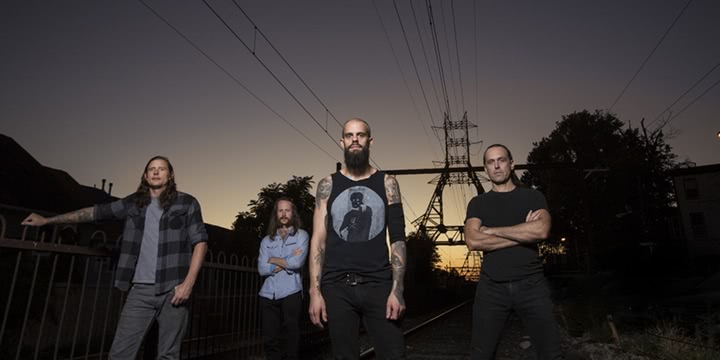Baroness’ fourth album,Purple, continues their navigation of the colour wheel. Set for release this Friday, the recordfollowsYellow & Green(2012),Blue Record(2009) andRed Album(2007).
Aside from the continuity, the new album’s title can be seen as a reference to the bruises the US band incurred from a near-fatal bus crash in August 2012. However, purple is also a wonderfully comforting colour, often associated with magic and sensuality. Accordingly, while Purple is a sonically powerful record that touches on dark themes, it’s also an uplifting listen.
“I’ve been struggling for the past couple of years via the fallout from the accident,” says frontman John Baizley. “But I’m the luckiest guy in the world because I’ve got this wonderful outlet to pour all of my thoughts into, and we’ve got this amazingly positive fan base who seems to respond really well to the songs that we write when we’re being honest and open about what’s going on.”
Although generally classed as a metal band, with Yellow & Green, Baroness swerved away from the in-your-face heaviness of their first two records. Purple carries over the melodic clarity of Yellow & Green, while also incorporating a tinge of stadium rock immediacy.
“We’ve spent a long time trying to set in the stone the fact that we are not going to repeat ourselves and we’re not going to become comfortable with one particular sound,” Baizley says. “There are elements of our music that get repeated – there are themes that we stay with, and I would say we have developed a sound. But part of that sound requires that there’s always somewhere new to go, some new frontier that we haven’t investigated yet, or else we’ll get bored and quit. We need to evolve, we need to grow as musicians and as a band.”
Helping foster the band’s evolution on Purple was producer Dave Fridmann. Across a three-decade career, Fridmann has frequently collaborated with The Flaming Lips and Mercury Rev, as well as producing everyone from Weezer and MGMT to Sleater-Kinney, Neil Finn and Spoon.
“It’s always been a dream of mine to work with him,” Baizley says. “I didn’t think it was a realistic dream, ever. But he said yes, and in doing so he gave us more confidence to push harder and to try to write better songs with more interesting parts and to set our bar that much higher.”
Baroness’ previous two records featured production from John Congleton. Having worked with the likes of St. Vincent, Swans and Cloud Nothings in recent years, Congleton certainly knows his way around the studio. However, the band looked to gain something else by partnering with Fridmann.
“We’ve gotten to the point in our career where we feel confident enough and comfortable enough with what we do that we wanted an outside opinion,” Baizley says. “[Fridmann]’s a bit out there and we feel a bit out there from time to time. So in collaborating with him and co-producing this record with him, we were really able to work with somebody I consider an outright genius in terms of creating audio soundscapes and albums.”
Despite Baizley’s patent admiration for the producer, it was a somewhat surprising match-up considering Fridmann hadn’t worked with any acts quite so heavy and progressive as Baroness. The relative disparities in each other’s approach actually became a creative pivot. “Being fully outside your comfort zone and holding yourself to a very high standard is important if you’re going to make any kind of breakthrough,” Baizley says. “I think we were making that breakthrough by ourselves anyway. He helped [us go] even further.
“We trust ourselves, and we’ve become confident over the years. With that confidence comes an open admission that maybe we haven’t considered every option that’s available. And the best way to [find out] is to have a dialogue – if you can truly be democratic and make informed decisions, out of that can be born something that’s very unique.”
In contrast to the positivity surrounding the recording, the debilitating bus crash did leave an undeniable imprint on the album. Half of the band moved on following the accident, opening the door to bassist/keyboardist Nick Jost and drummer Sebastian Thomson. Death is something we’re made aware of every day; we see it in newspapers and on the television news, and depicted in films and novels. But it isn’t until death comes right up and touches us – say, if a close friend or family member dies – that we’re reminded of its unflagging inevitability. When their tour bus fell from a viaduct near the city of Bath in the UK, Baizley and guitarist Peter Adams didn’t just stare death in the face, but it remained oppressively apparent for a long time afterwards.
“[Death] leaves an impact, it dents your psyche and puts something there that cannot be removed,” says Baizley. “I don’t think that’s entirely a negative thing. It has negative elements, but if you can go with that in a way that isn’t destructive then you’ve just grown that much.
“Through that accident, it was a goal of mine to make a conscious effort to have a healthy respect of what we have been through, but not to focus on it and let it work at us in a negative way. The fact that we took all of this crap that happened to us and didn’t let it destroy us has been a really profound thing.”
Baroness’Purpleis out Friday December 18 through Abraxan Hymns/Cooking Vinyl.

































